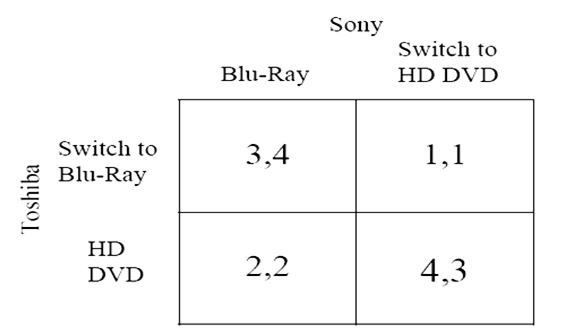What payoff would Toshiba get if it chose to produce HD DVD and Sony chose to produce Blu-Ray?
In 2006, there were a number of media reports about the next generation of DVD players, which produce much clearer picture and sound than that produced by current machines. However, there are two competing formats, Blu-ray (Sony) and HD DVD (Toshiba). Both are affiliated with certain movie studios, which have agreed to release their movies in one or the other of the new formats. This creates a problem for the producers of this new technology—they all want their own version to win out, but by competing they make it entirely likely that most consumers will sit back and wait until (a) one of the formats is a clear winner or (b) a newer, even better, method of supplying movies is developed by someone else. If the latter happens, both Sony and Toshiba lose out.
Imagine that both companies have developed a new product, but with different formats. If one of the companies would be willing to switch quickly (assume that copyright laws would allow it to produce something similar), that company would lose some time and market share but be able to get into the market. Consumers would be more willing to buy the new technology, and both companies would make more money. If neither company is willing to coordinate with the other, they end up in a war of attrition, with fewer customers. This is shown in the game below.

A. 1.
B. 2.
C. 3.
D. 4.
B. 2.
You might also like to view...
In the twentieth century, the government expanded its role in protecting workers. Which of the following statements is NOT true about this expansion?
a. It included the establishment of minimum standards for unemployment insurance and insurance against workplace injuries, although these benefits and eligibility requirements vary dramatically by state. b. These programs for workers are primarily distributive in nature. c. It included expanded regulation of pension systems. d. The United States offers fewer guarantees to its workers than do other advanced democracies. e. These protections receive less public support than do programs to assist the poor.
Denying someone the chance to vote based on his race would be a violation of which of the following?
a. Her civil liberties b. The First Amendment c. Affirmative action d. His civil rights
The Three-Fifths Compromise __________
a. limited imported goods to 3/5s of a ship's cargo b. was a compromise with southern slaveholders about how slaves would be counted c. limited the amount of taxes that could be raised by the national government d. increased the power of northern states
What was the role of the states in President Lyndon B. Johnson’s “War on Poverty”?
a. States were charged with identifying which citizens were eligible for these programs, while the federal government was charged with delivering the programs. b. States initiated these programs, which were codified and coordinated by the federal government. c. State and local governments partnered with the federal government to deliver social programs. d. The “War on Poverty” was a federal program that took supremacy over state social programs.